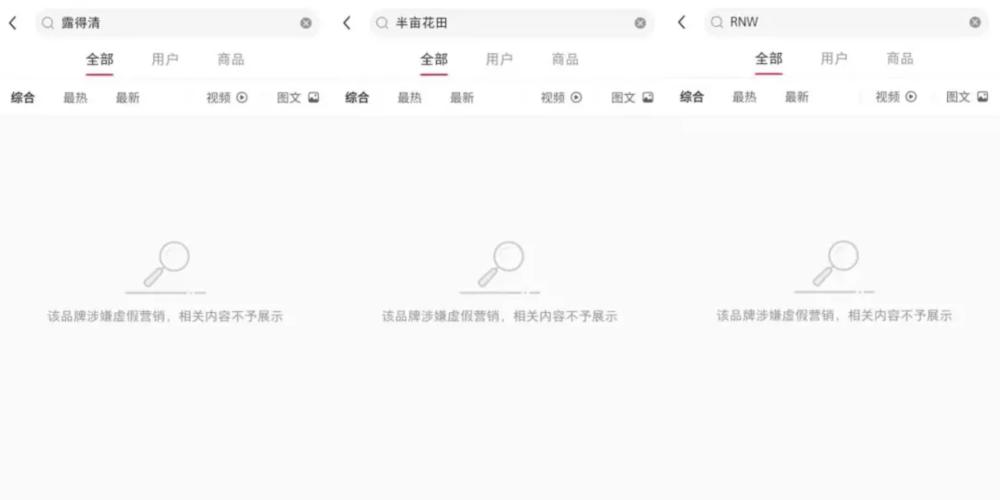Reporter | Chen Qirui
Edit | Lou Shuqin
1
The topic related to "Xiaohongshu banned 29 suspected false marketing brands" appeared in Weibo hot search. Some netizens found that the content of brands such as Dove, Lu deqing, Half Mu Huatian and Nivea could not be searched on the Little Red Book, and the search page showed that "the brand is suspected of false marketing, and the relevant content is not displayed.".
The relevant staff of Xiaohongshu responded that the content involved in the banned brand is seriously suspected of false marketing, which has affected the judgment of users and interfered with the normal order of the platform. However, as of press time, Xiaohongshu has not publicly disclosed the follow-up processing process of the brands involved and the date of lifting the ban.
Some brands have been banned by Xiaohongshu and have been wronged. According to the beauty information media Jumei report, the person in charge of a certain brand involved said that all the commercial content of Xiaohongshu has gone through the formal process before it is released, and the non-compliance may be caused by the improper operation of some agents, and is currently being investigated.

The content of the brand involved can no longer be displayed in the Little Red Book
However, whether it is a brand or an agent, they are facing the increasingly tightening content supervision and review mechanism of Xiaohongshu. The rectification began to accelerate in 2019, and Xiaohongshu issued new regulations in May and June of the same year, regulating the MCN institutions that collect KOLs for content production, and requiring the settled institutions to pay a deposit of 200,000 yuan.
The penalty rules have also been upgraded. According to the regulations, if the commercial institution violates the relevant rules of the platform during the settlement process, Xiaohongshu will terminate the cooperation and will deduct the security deposit, of which the penalty of "private order" is the most serious, directly deducting the security deposit of 200,000 yuan. In addition, "partnership fraud" and "data fraud" will also deduct a deposit of 100,000 yuan.
The promulgation of this series of regulations is related to the controversy surrounding the content of the Little Red Book in recent years. As one of the most influential social media platforms on the Chinese Internet, Xiaohongshu's conversion rate exceeds that of Weibo, Douyin and Kuaishou, and skin care, clothing and makeup are the three areas with the most commercial investment on Xiaohongshu.
However, due to the high fan and interaction rate threshold proposed by Xiaohongshu for red bloggers to receive advertisements, some bloggers chose to increase their popularity by injecting water into the comments. Previously, the topic of "Little Red Book Grass Notes For 4 Yuan" was on Weibo's hot search. A number of media disclosed that the industrial chain of Xiaohongshu brushing has been extremely mature, and a quotation ranges from 3-5 yuan. In order to gain attention, some brands have also joined the army of brushing traffic.
Image source: Sohu
In fact, the "fake grass" behind false traffic has always been the most sensitive topic of Xiaohongshu. Fake filters and fake shows of wealth have sparked heated discussions on social media such as Weibo, and although Xiaohongshu has repeatedly issued statements saying that it will vigorously rectify the content of the platform, similar phenomena have been difficult to completely prohibit.
However, the frequent controversies do not affect the investment institutions' optimism about the operation model of Little Red Book. Since its inception, Xiaohongshu has accumulated 6 rounds of financing, the most recent round of financing of US$500 million was completed in November 2021, led by Tencent and Temasek, and followed by Alibaba, Tiantu Investment and Yuansheng Capital.
After several rounds of financing, Xiaohongshu has become one of the most valuable social media platforms in the current Internet industry. But like all social media platforms, Xiaohongshu also needs to start thinking about how to maintain the balance between commercial content and user experience in the future development, while also maintaining the loyalty of KOLs to the platform. Banning brands in the name of spurious marketing is a deterrent, but it is not a means of long-term sustainability.